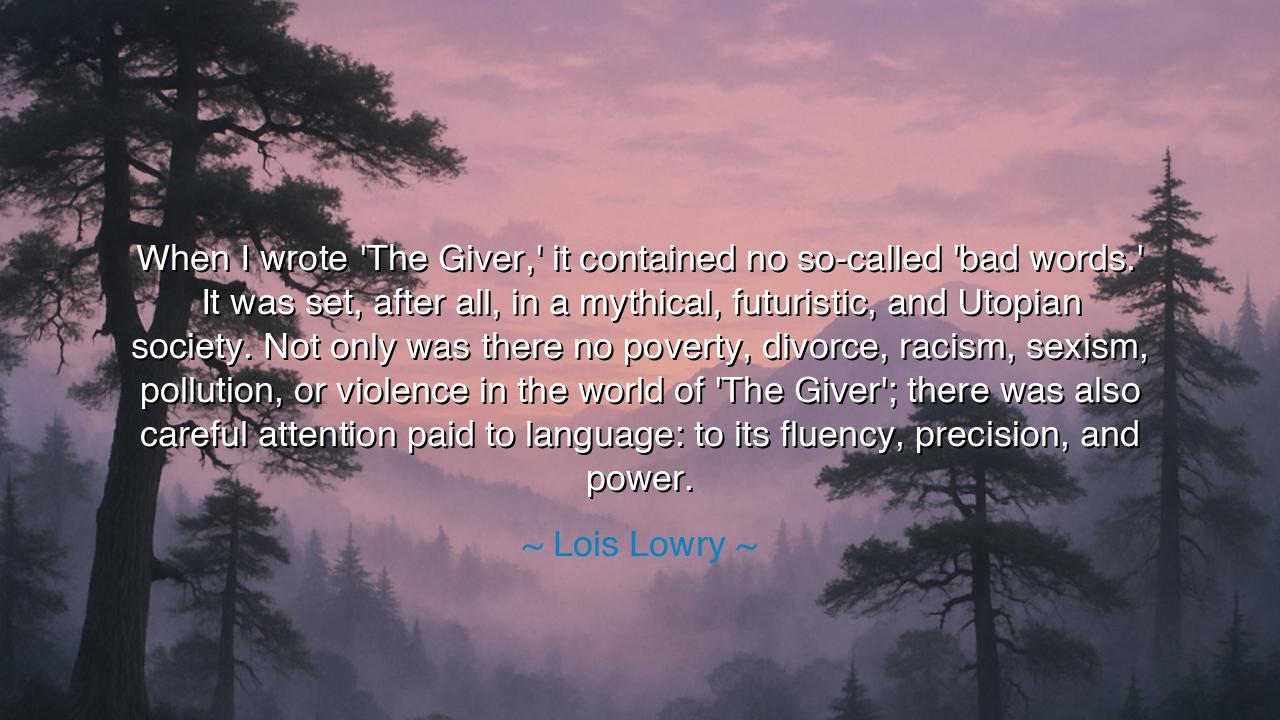
When I wrote 'The Giver,' it contained no so-called 'bad words.'
When I wrote 'The Giver,' it contained no so-called 'bad words.' It was set, after all, in a mythical, futuristic, and Utopian society. Not only was there no poverty, divorce, racism, sexism, pollution, or violence in the world of 'The Giver'; there was also careful attention paid to language: to its fluency, precision, and power.






The words of Lois Lowry, “When I wrote The Giver, it contained no so-called 'bad words.' It was set, after all, in a mythical, futuristic, and Utopian society. Not only was there no poverty, divorce, racism, sexism, pollution, or violence in the world of The Giver; there was also careful attention paid to language: to its fluency, precision, and power,” are a meditation on the fragile bond between society and language. In them, she reveals that the heart of her story was not merely the absence of visible evils, but the shaping of speech itself. For when language is guarded, tamed, and stripped of its edges, thought itself begins to narrow, and with it, the soul of a people.
The origin of these words is found in Lowry’s vision of The Giver, a book that crafted a Utopian society where suffering seemed erased—yet only by erasing choice, memory, and feeling. In such a world, the greatest tyranny was not hunger or war, but the loss of words. By controlling language, the rulers controlled reality. A word misplaced, a phrase softened, a truth erased—these became the tools of power more subtle than any sword. Lowry reminds us that words themselves are not ornaments, but vessels of truth, and when truth is constrained, society, however peaceful it may appear, becomes a hollow cage.
History confirms her warning. In the 20th century, regimes such as Nazi Germany and Stalin’s Soviet Union mastered the art of controlling language. Words like “cleansing” or “re-education” masked horrors of mass murder and imprisonment. In George Orwell’s imagined Newspeak from 1984, vocabulary itself was reduced so that rebellion became literally unthinkable, for the words to describe freedom had vanished. These examples show us what Lowry illustrated through fiction: that the true battlefield is not only in the streets, but in the words we are allowed to speak.
Yet there is another side to her teaching: the power of language to preserve freedom. Consider the speeches of leaders like Martin Luther King Jr. His words—“I have a dream”—gave shape to a vision of justice that stirred millions. Or the poetry of Maya Angelou, whose language carried dignity and healing for the oppressed. Their words were not merely sounds; they were weapons and balm, instruments of liberation. Here lies the paradox: a society may silence violence and hunger, but if it silences language, it silences the very force that awakens humanity to its own potential.
The meaning of Lowry’s reflection is thus layered. On the surface, it explains why The Giver is without profanity or vulgarity. But beneath it lies a deeper truth: that a truly Utopian society must guard its language carefully, for language is the wellspring of thought. To strip it of depth is to strip life of meaning. Precision, fluency, and power are not luxuries of speech; they are the guardians of freedom and the architects of imagination. A society that neglects them risks descending into dull obedience, where no evil is seen because no words exist to name it.
The lesson for us is urgent. Guard your language. Do not allow it to decay into carelessness, nor to be manipulated into emptiness. Speak truthfully, even when it is uncomfortable. Use words not to disguise reality, but to reveal it. Teach children the richness of vocabulary, for in their words lies their power to resist, to dream, and to lead. And as a community, resist the temptation to silence what is difficult, for in silencing discomfort, you may also silence truth.
Practical actions are clear. Read widely, not only for information but for the shaping of language. Encourage dialogue that values clarity over slogans, truth over comfort. When you see language used to mask injustice—when violence is called “conflict,” or cruelty “necessity”—unmask it. And honor those who wield words with precision and courage, for they are the true defenders of liberty.
Thus let Lowry’s words endure: society is defined not only by what it permits or forbids, but by the words it allows to live. Poverty, war, and injustice may be conquered, but if language itself is tamed, humanity’s spirit withers. Therefore, let us treasure words, guard them, and use them with care—for in their fluency, precision, and power lies the future of every society.






AAdministratorAdministrator
Welcome, honored guests. Please leave a comment, we will respond soon